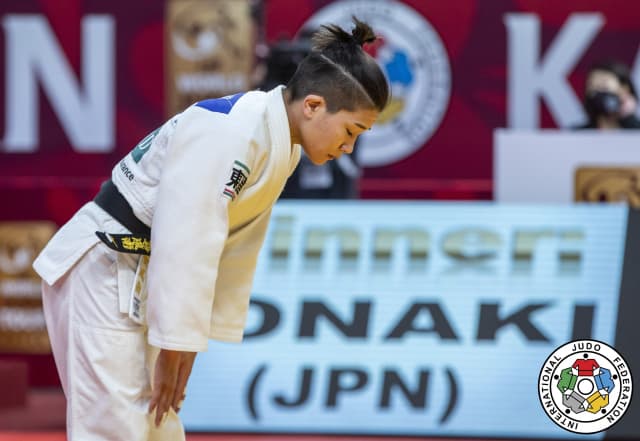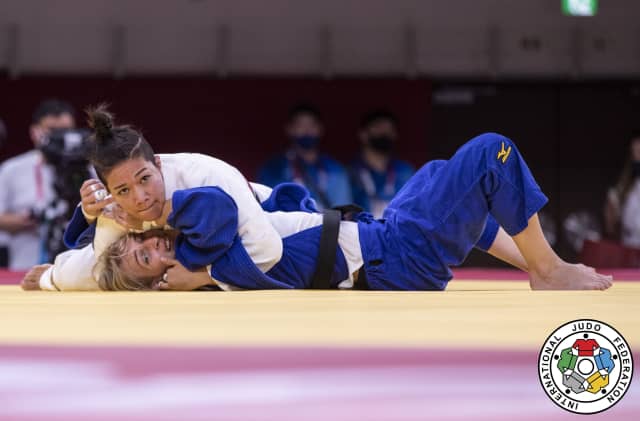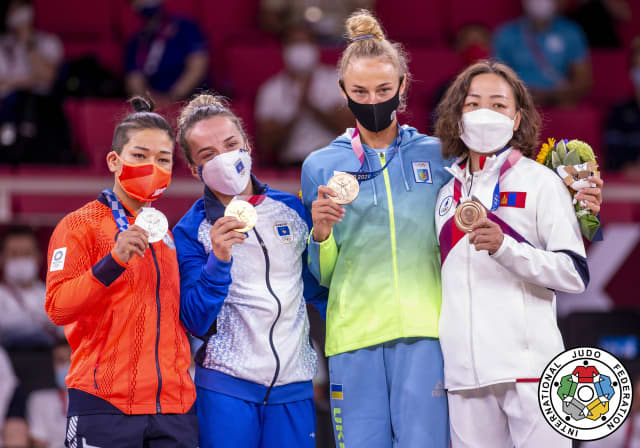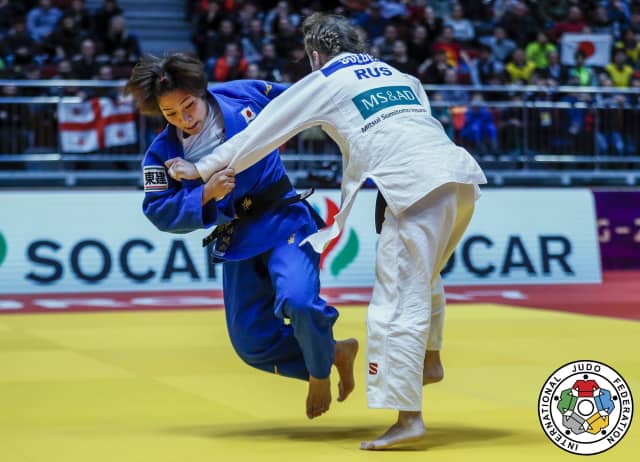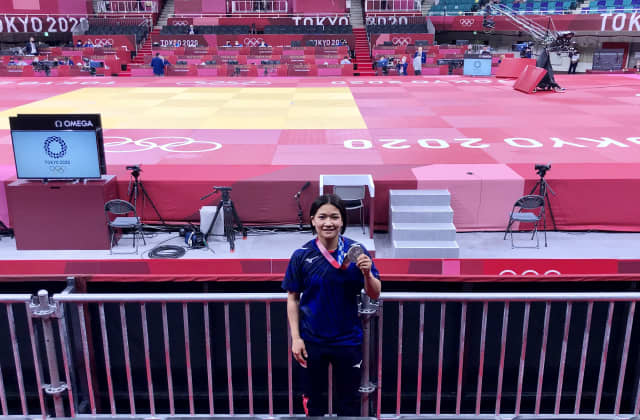Diminutive in stature but fiercely independent and bearing the load of a huge spirit effortlessly, she has an open and honest sense of self. Tonaki is feeling more and more embedded in her judo life as the years pass.
When we watch you fight we always feel that you are enjoying the competition. Is this the case?
“Usually I don’t suffer from nerves. I feel them but find them energising and as long as I always accept them, I can compete calmly and enjoy the experience.”
It has been some time since you last competed and you have been fighting at -48kg throughout your career. How do you manage your weight?
“When I was still at school and competing at a high level too, it was difficult to manage. I didn’t have the knowledge so I struggled a lot. Since being on the national team I have a nutritionist and a personal trainer to help manage this. Now there’s no stress at all around weight. I’m really comfortable and I know what I need to do. My team do a great job.”
You are a dangerous opponent and so everyone studies you before the competitions. What techniques might you like to learn next to increase your opportunities on the tatami?
“There are no specific techniques I feel I need to acquire; I have a good range but I want to improve on how I react to my opponents’ techniques. At this level it’s necessary to have a very strong response to attacks and polish the details of the techniques I already have.”
We are sure that not all your feelings are positive when it comes to results; 2 silvers at the world championships and silver at the Olympic Games. It is an impressive record but how do you view it?
“Three silver medals means being beaten by 3 opponents, or so it seems from the outside but actually I was beaten by myself. I didn’t control those situations mentally and so now I want to overcome that weakness. It’s really hard to win silver medals but my club coach is really the person I speak to most about this side of my judo. Sonoda-sensei gives me the tiny details for kumi-Kata and talks to me about lots of different things. He couldn’t come to the venue here because the protocol is very tight with the Covid situation, but we have stayed in touch throughout, by message. He was quite happy with my fighting here.”
What is your routine for the 24 hours before you compete?
“I don’t have a routine and I don’t want one. To stick to things that must be done at a specific time could be very restrictive. Now everything is instinctive. I like to keep it that way. For this Games the draw was two days before, which is unusual when compared with the World Judo Tour events. That gave lots of time for studying and practising so it was quite a relaxed preparation phase. It wasn’t hard to get my weight right; weight control was an easy process this time. Maybe there’s a geographical benefit, with regard to weight and relaxation. I didn’t have to manage long travel or being too far from things I am used to.”
Maybe you don’t have a routine for this but what do you like to eat on competition day and why?
“On competition days I take gels and energy foods only. I don’t like to use energy to digest. The day before competition I love to eat meat, a lot of chicken and red bean mochi. I feel strong with these foods.”
You are really setting your own path but still there must be a role model you really look up to?
“I admire Ayumi Tanimoto. Her style is always to chase ippon. She and I have different styles but we both still wish to get ippon, either in tachi-waza or ne-waza. I didn’t plan it this way but I feel my power isn’t enough for always doing big throws. It happens that my style is growing more in ne-waza, so I want to throw more, more like Tanimoto.”
You are still young and have many more years of competing ahead of you, but do you already have a vision of your figure, beyond your national team days?
“First, it’s really important for me to stay focused on standing on the highest place of the podium, simple as that. This is first but at this Olympic Games I had a sort of revelation. Before the Games I was thinking that I’d like to be working like a normal person, having an ordinary life, but once standing on the tatami at the Olympic Games I started to think about wanting to teach good Japanese judo to children in other countries. I want to pay it forward and also give back to the sport. This competition changed my mind on some things and made me feel clearer about my potential to be an educator for judo. I thought about it before but didn’t allow these thoughts to rest with me. Now, being here at the Budokan, at the Games, this idea has solidified; it’s very clear.
You know, I have no expectations for how I am viewed by the public but when I realise that people are moved or inspired by my judo, it makes me feel really inspired. I am just me! So, it is always a surprise, a good feeling, when I know people appreciate my judo. I don’t ever want to be self-centred. I want to always see things in an objective way, to always have integrity and focus on honesty. On the tatami I am only bringing me, no show, nothing to try to create opinions. In this way I know that what I achieve is always through honest means.”
Funa Tonaki is glad to have spent some time at this Olympic Games. Yes, she won a medal and had some great fights. Yes, there are some outstanding photos of her participation, but the real beauty of her Tokyo 2020 experience is that the vision of her future became clearer and this has fed directly into her confidence and her understanding of what has to come next. This is as good as gold!

